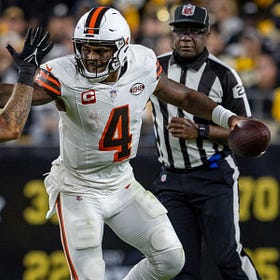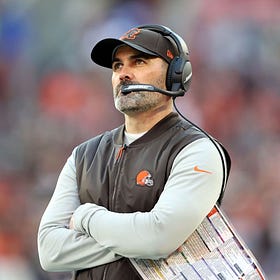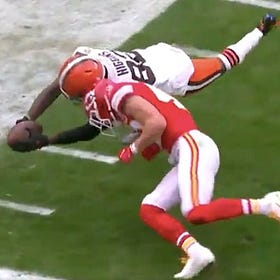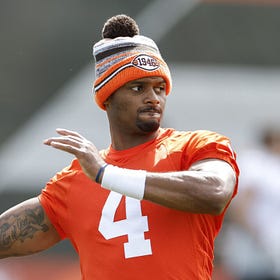The Browns Recovered Their Own Fumble
Cleveland's playoff berth highlights the folly of the Deshaun Watson trade
It was the summer of 2013 when I got a call from an older relative. The Cleveland Guardians had just been shut out by José Fernández and the Miami Marlins, and he was incredulous. “What the hell’s wrong with this team?” Never mind that Fernández was a young phenom who would soon win the Rookie of the Year award, that the Guardians were still 11 games over .500 and on their way to a playoff berth, or that the defeat snapped an eight-game winning streak. One loss in their last nine games and he was convinced that the sky was falling.
When friends ask me what Cleveland sports fans are like, I always think about (and often tell) this story. We have reverence for the teams’ histories. We are patient and loyal — we will never be accused of being fair-weather fans. Yet our most-distinctive attribute is our skepticism. Our long-suffering nature has conditioned us to understand that success is merely the precursor to failure. There are diehards from other cities who overreact to losses or expect to have their hearts broken, but after all we’ve been through, especially in the NFL, those of us who grew up in Northeast Ohio are uniquely incapable of appreciating when times are good.
Maybe that explains why I am choosing this week, mere days before they kick off in the first round of the playoffs, to complain about the Cleveland Browns.
Content warning: Sexual violence
The Browns’ 2023 season got off to an inauspicious start. There had been cautious optimism around Deshaun Watson, whom the Browns disgustingly traded for and signed to a $230 million contract in 2022 amidst sexual assault and harassment allegations from 30 different women, and who looked conspicuously mediocre upon debuting after his well-deserved suspension. The party line was that a full, normal offseason would set Watson up for a rebound year. That narrative fell apart by Week 2, when he put up a miserable showing against a mediocre Pittsburgh Steelers team. As if the face of the franchise having one of the worst quarterback games I’ve ever seen (that’s saying something coming from a Cleveland fan) wasn’t bad enough, the Browns lost Nick Chubb, their best offensive player, to a season-ending knee injury.
The clown show continued. A shoulder issue rendered Watson unavailable for the Browns’ fourth game of the year, leaving the clearly unready Dorian Thompson-Robinson only a couple hours to prepare for his first NFL start. The team insisted that Watson’s malady was minor and fleeting, yet he played only a single quarter in the month of October. He finally showed fans a glimpse of the quarterback we’d been promised in Week 10, when he shook off an injury-aggravating hit in the first half and led the Browns to a thrilling comeback win against the soon-to-be AFC top-seed Baltimore Ravens — then was shut down for the rest of the season. Staking the fate of the franchise on Watson, who has now played in only 12 of his teams’ last 50 games, in exchange for punting last year (while he served his suspension), the future (as the roster holes from draft picks they traded for him grow conspicuous), and any semblance of morality (in rehabilitating a serial sex pest’s image) looked like a franchise-altering mistake.
Deshaun Watson and the Faustian Ripoff
The Browns sold their soul for naught. Time for an organizational exorcism
But something funny happened this season: The Browns caught some breaks. For decades, watching Cleveland football has meant rooting for a team that isn’t just bad, but unlucky. Injuries, bad calls, blown coverages, easy drops, missed kicks — this franchise simply found a way to lose. Even the best Cleveland roster of my lifetime, the 2020 team led by Baker Mayfield, got knocked out of the playoffs when they fumbled the ball through the endzone on a blatant uncalled helmet hit. In a league where almost half the teams make the playoffs every year, that’s the only postseason the Browns have played in since I was in fifth grade.
There’s a different vibe this year. “The football gods rarely smile upon the Browns,” Jordan Zirm wrote, “which is why what’s happened … feels so jarring.” Second-string running back Jerome Ford has capably filled Chubb’s big shoes. Tight end David Njoku, in his seventh season with the team from whom he had requested to be traded on multiple occasions, is having a career year. Cleveland beat both of this year’s top seeds, complementing their win over the Ravens with an upset over the San Francisco 49ers — with a backup quarterback. The franchise for whom nothing ever goes right somehow fumbled into an 11-6 record and the AFC’s top Wild Card spot.
The face of the Browns’ improbable run is Joe Flacco. The Dawg Pound is intimately familiar with Flacco, who spent a decade with the rival Ravens and is 18-3 in his career against Cleveland. He has been a revelation since the Browns picked him up off the free agent scrap heap in November, winning four of his five starts while averaging 2.6 touchdowns and 323.2 passing yards per game. The synergy between head coach Kevin Stefanski, who conspicuously tempered his trademark aggressive play-calling while Watson and his other backups were under center, and Flacco, who evidently still has his signature arm strength, has been a thrill to watch.
As a Browns fan, I’m happy to admit I was wrong in September, when I thought the twin miseries of Chubb’s injury and Watson’s mediocrity signaled the premature end of their season. While it’s facile to say this success rebuts my skepticism last summer about the organization’s ability to foster clubhouse chemistry, I’m glad to say that no longer seems to be an issue. Yet the Browns making the playoffs does affirm one longstanding criticism: the Deshaun Watson trade was incredibly stupid.
The Browns acquired Watson because they believed they had a championship-caliber roster, save for an elite quarterback. The injury-hampered Mayfield was deemed unfit for the task just a year after he led the team’s short but magical 2020 run. They wanted an upgrade, and for obvious reasons Watson was on the trading block. The draft capital and salary-cap space it took to bring him in, to say nothing of the grotesque lengths leadership went to to pretend he was a good person, signaled that he was not merely a but the missing piece who would bring this team to the Super Bowl.
This thinking had obvious flaws even at the time. If short-term quarterback play were the priority for a team in win-now mode, why would they cash in all their chips for a guy who’d just sat out the year and was facing a lengthy suspension? Now consider that logic in light of what we’ve seen the Browns do with Flacco.
Baker Mayfield and the Precarity of Sports Narratives
How a single blown call changed the trajectory of the Cleveland Browns
Flacco’s game is not perfect. His arm is strong, but not always accurate. His 3.9 percent interception rate this year is second-worst among QBs with at least as many pass attempts. Yet the Browns’ offense is clicking in a way that it hasn’t in three years. It’s as damning of the front office’s evaluation skills as it is fortunate for the franchise both that they can win with what the league had considered a replacement-level quarterback, and that the purported star for whom they gave up three first-round draft picks has been outplayed by a guy the team signed off the couch.
What if Cleveland had signed Flacco two years ago instead of trading for Watson? It wouldn’t have taken much to outbid the New York Jets, who signed him for $3.5 million to be their backup quarterback. If Flacco had played near this level in 2022 in place of Jacoby Brissett and the rusty Watson, maybe the Browns would have snuck into the playoffs — especially if they had supplemented the roster with their preserved first-round pick, or traded it for another upgrade elsewhere. Now imagine how this year’s team would have looked if Flacco were under center from the beginning, including two more years of draft picks and $60 million or so in extra salary-cap space than in our current timeline. They might have this week off, enjoying the first-round bye awarded to the conference’s top seed.
Heck, what if the Browns had kept Mayfield? The former number-one pick is also playing this weekend after his perfectly cromulent season helped the Tampa Bay Buccaneers to an NFC South title. Maybe he needed a change of scenery to rebound; fairly or not, it’s safe to say he wore out his welcome in Cleveland. Still, every important metric I can find says Mayfield played at least as well as Watson did in 2023 on a per-snap basis. The Browns squandered all that money and all those picks to upgrade from Mayfield, only to see him outplay Watson in the most-important year of his deal.
The best thing about this playoff run is that Watson isn’t part of it. In the aftermath of the trade, I spent months wrestling with whether or not I would remain a Browns fan. I ultimately decided to try to compartmentalize my fandom from my morality — hoping the team would lose as some meek karmic justice for sins more serious than a game felt even emptier to me than sticking with them. (I remember what it was like when the Browns would face Ben Roethlisberger.) Still, I can’t bring myself to root for Watson. I find myself torn on every snap between wanting my team to do well and hoping Watson takes a sack or throws a pick, so that he is made to feel at least some lesser form of shame.
It’s different watching Flacco. He’s the villain-turned-hero, the underdog story, the clubhouse’s cool uncle. Most of all, he hasn’t been accused of multiple instances of sexual violence. Yes, Watson is still there on the sideline. They often cut to him on TV, looking resolute. If the Browns win it all, he will get a ring and hoist the Lombardi Trophy. But at least I can wholeheartedly cheer for my team while they’re on offense without secretly rooting for a linebacker to get through the pocket.
The Root, Root, Root of All Evil
On Deshaun Watson, Ben Roethlisberger, and the morality of sports fandom
A few months ago, I likened the Watson trade to a ripoff deal with the devil, in which even the transient earthly reward isn’t actually any good. The protagonist of Damn Yankees didn’t sell his soul to hit .200! It seemed the team’s braintrust — whatever combination of Chief Strategy Officer Paul DePodesta, General Manager Andrew Berry, Stefanski, and ownership actually had decision-making power — had been so myopically focused on absolving an unrepentant rapist that they forgot to consider whether he would actually help the team. Now I would tweak the analogy: The Browns made a Faustian bargain even though a comparable prize was available on eBay, from a seller who wouldn’t demand the organization’s soul.
It is a testament to DePodesta, Berry, Stefanski, and their staffs that the Browns turned what looked like a lost season into a playoff run. Yet any credit they receive for their shrewd roster-building and game-planning carries the caveat of why the team needed so much help — that this same braintrust made one of the worst trades in the history of professional sports. It’s a fitting metaphor for the 2023 team, which both led the NFL in turnovers and gave up the fewest first downs on defense (albeit an uncharacteristic stroke of luck for this ever-hapless franchise) that they fumbled the ball, then made a stop.
The stench of the Watson trade will linger for as long as he and the decision-makers who acquired him remain on the payroll. Luckily, for now the fate of the Browns is in someone else’s hands.






